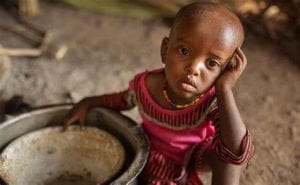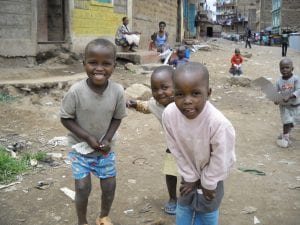by Grace Ndanu

I am used to children not attending school due to cultural practices and beliefs. Young girls might be sold out to their husbands when they are minutes or hours old. This led to child preference in some Kenyan communities, where only boys are taken to school while the girls are forced to stay at home so that they can undergo training on how to perform wife duties when they reach puberty and get married to their seventy plus years old husband. In this case education is considered meaningless for girls since they will be released to their husbands. They don’t consider the dowry that is paid a contribution from the girls; instead they assume that it is a payment for training a good wife. On the other hand, boys are considered to be of value to the family because they will attain the name of the family. That’s why they are taken to school.
This time it is a different sad story – a very high number of both boys and girls drop out of school. Not because of cultural practices but because of hunger. In most Kenyan counties, children go to school because there is lunch provided. For some families that is the only meal that the children have because their families can not provide them with food. Due to climate change, which has brought forth drought, the schools provide little or no food for their students now. The situation is alarming because there is no learning, the children are hungry, sleeping and collapsing in school. The majority are distracted by their rumbling stomachs.
Lack of food has a negative effect on the lives of learners, especially the primary school children. Traditionally, assembly is conducted while the students are standing. For the first time in history, in some parts of Kenya, assemblies are conducted while pupils are sitting. Not a long time ago, it was a taboo for a child to be addressed by a teacher while sitting down. Now they are forced by hunger to sit while being addressed by their teachers. In addition to hunger, children walk more than twenty kilometres to school, and when they get to school they are tired.
Kenya is comprised of 47 counties. Twenty three of them, which have roughly 4.35 million people, are facing droughts that are getting worse. The twenty three counties are more of pastoralists. They don’t rely on anything else apart from livestock for survival and hence they are more affected because the livestock have nothing to feed on. Kajiado is one of the most affected counties where children drop out of school to support their families by searching for animal feed. This includes going up the acacia shrubs to collect seeds to feed the animals. Others have been forced to move away from home with the cattle in search of pasture. The ones who remain are left with little or no food.

There are several interviews that have been made around the most affected counties. In Samburu County, parents said that their children never reported back to school since July. The reason being, there is no rain, therefore they have to move around with their children in search of food. Teachers of the same county said that also the performance of their pupils has dropped, because of little or no learning at all. They find it difficult to teach hungry and weak children, which forces them to dismiss afternoon classes. It gets even sadder because sometimes parents visit the schools hoping to have lunch, which the law doesn’t allow.
In the coastal region, drought has pushed wildlife out of different parks to villages, which complicates the situation even more. The leaders called upon teachers and children and their parents not to risk their lives by going to school until elephants are contained in their parks. This is even more dangerous because the elephants arrive unexpectedly at any time of the day. The solution was for the children and their teachers to stay at their homes and wait for the county officials to do what they must do for them to resume, which seems it is until next year…unlike for the candidates who are waiting for their final primary and high school exams.
Most parents have opt to look for food for their children rather than paying school fees for their children. Following the most reason for school dropouts for the second and third term this year the school officials have called upon the ministry of education and the nation officials to ensure schools and communities in arid and semi-arid lands are provided with relief food. If the communities have food, the schools will be food secure. I believe if a child is assured of a meal they will show up for school and will fully concentrate in class.
